|
|
|
Sort Order |
|
|
|
Items / Page
|
|
|
|
|
|
|
| Srl | Item |
| 1 |
ID:
169808
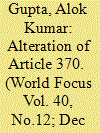

|
|
|
|
|
| Summary/Abstract |
Imran Khan the Prime Minister of Pakistan was flying high and had developed a tinge of aggressiveness in his diplomatic offensives after Trump’s offer of ‘mediation’ on Jammu and Kashmir (J&K), where Donald Trump, the American President allegedly also quoted Narendra Modi, the Prime Minister of India that he too has asked for mediation. While the Trump’s statement led to a furore in India, Imran in Pakistan started preparing ground for securing international backing on Kashmir. However, he never anticipated that Modi’s Government would drop a ‘bombshell’ by rendering Articles 370 and 35A infructuous. Pakistan used this as an opportunity in connivance with China to take the issue to the United States Security Council (UNSC).
|
|
|
|
|
|
|
|
|
|
|
|
|
|
|
|
| 2 |
ID:
169818
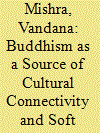

|
|
|
|
|
| Summary/Abstract |
During 74th Session of the United Nations General Assembly (UNGA) Prime Minister Narendra Modi gave a clarion call to the leaders of the world about India’s long cherished faith, trust and contributions to the value of Peace in general and international peace in particular. Highlighting India’s contributions towards global peace and harmony he told the world leaders, “India gave the world ‘Buddha’ and not ‘Yuddh’ (War)”.1 He further made it explicit that India’s gift to the world is Lord Buddha’s wisdom and message of peace instead of war. Precisely this is the reason that India’s voice against terrorism to alert the world about this evil, rings with seriousness and outrage.
|
|
|
|
|
|
|
|
|
|
|
|
|
|
|
|
| 3 |
ID:
169809
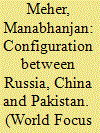

|
|
|
|
|
| Summary/Abstract |
The shift in Russian policy towards Pakistan and its close cooperation with China has alarmed policymakers and strategic community in India. It is also acknowledged that Russia has supported the position of India in UNSC closed-door meeting, which rejects attempts by third countries or international organizations to participate in resolving the Kashmir issue, was in favour of a settlement in bilateral negotiation. The paper suggests that India along with Russia can probably engage both China and Pakistan in a various multilateral forum such as RIC and SCO.
|
|
|
|
|
|
|
|
|
|
|
|
|
|
|
|
| 4 |
ID:
169820


|
|
|
|
|
| Summary/Abstract |
Afghanistan has in its proximity to the four Nuclear weapon States of China, Russia, India, and Pakistan. Geographically, Afghanistan is sandwiched between Central Asia and South Asia. Geopolitically, control over Afghanistan is vital for control over South Asia. Therefore, any deal with the Taliban would have geopolitical implications for the region and world. Moreover, Afghanistan is a connecting link between South Asia with Central Asia. Geo-strategically, the country is a perfect location for the superpower like the USA to counter Russia and China in any possible confrontation. For India, Pakistan, and China, Afghanistan enjoys a location of vital geostrategic space for countering each other for their security interests.
|
|
|
|
|
|
|
|
|
|
|
|
|
|
|
|
| 5 |
ID:
169819
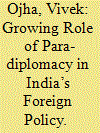

|
|
|
|
|
| Summary/Abstract |
The notion of Para-diplomacy in india can be best understood through the innovative concept of Competitive Federalism. Indian Prime minister Narendra Modi once visited liberty foundation in America where he came to know the concept of competitive federalism. Immediately thereafter he discussed this concept with Niti Aayog. Niti Aayog felt the mesmerizing potential of this concept in context to indian federalism sometimes seen vulnerable due to states adamant behaviour towards central government. Niti Aayog, PMO and other concerned entities under prime minister Modi thought that a policy of engagement of Indian states in various sectors in a competitive manner could be formulated to harness development syndrome in the country .
|
|
|
|
|
|
|
|
|
|
|
|
|
|
|
|
| 6 |
ID:
169814
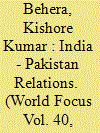

|
|
|
|
|
| Summary/Abstract |
India’s relations with Pakistan are characterized by mutual bickering, sinister wrangling, verbal dual, and simmering hostility which have been going on since the day of their Independence. Pakistan’s sponsorship of militancy and terrorism has made relations as bad as in the immediate aftermath of independence. So, India’s policy towards Pakistan has oscillated like a pendulum and Pakistan has now become India’s the most difficult neighbor and cannot be dealt with like India’s other South Asian neighbours because of number of factors like its strategic significance for outside powers like China and the USA, its military, nuclear and missile capabilities and its territorial dispute over Kashmir after bifurcation of Jammu and Kashmir into two Union territories. In this context, G Paarthasarathy, former Indian High Commissioner has observed that India-Pakistan reconciliation is like trying to treat two patients whose only disease is an allergy to each other.
|
|
|
|
|
|
|
|
|
|
|
|
|
|
|
|
| 7 |
ID:
169806


|
|
|
|
|
| Summary/Abstract |
As Indians received the delayed confirmation of the visit if Chinese President to India on 11-12 October, 2019, the Pakistani President Imran Khan has already wound up his China on 8 October, 2019. Finally Xi Jinping came to India. But as Indian diplomats were articulating the fallout of Modi and Xi Jinping informal summit in Mamallapuram, in the light of China’s ever shifting stand on Kashmir, the Chinese president landed in Nepal on 12 October, 2019 afternoon, giving them more food for thought. China’s these three engagements within a week highlight the three important shades of Indo-China relations as they are unfolding in the post-cold war era- China’s all weather and special strategic ties with Pakistan; China’s persistent efforts to make deep economic and strategic imprints in South Asia; and the efforts of the two countries to ‘manage’ their relations rather than ‘improve’ them within these structural constraints.
|
|
|
|
|
|
|
|
|
|
|
|
|
|
|
|
| 8 |
ID:
169803
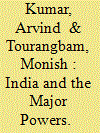

|
|
|
|
|
| Summary/Abstract |
The changing dynamics of geopolitics has led India to recalibrate its relationship with the major powers – such as the United States, Japan, China and Russia in the twenty first century. The political dynamics of these nations in particular are such where the convergences among major powers vis-à-vis India become a major part of discourse. India’s engagement with major powers in the twenty first century has been largely based on the principles of building win-win situation by emphasising and strengthening its economic diplomacy.
|
|
|
|
|
|
|
|
|
|
|
|
|
|
|
|
| 9 |
ID:
169802


|
|
|
|
|
| Summary/Abstract |
“My visit to Vietnam is to nurture a relationship between our two societies and nations. The linkages between our two countries have deep historical and civilizational roots, going back over two thousand years. These cultural bonds reflect themselves in many ways, most prominently, the connection between Buddhism and the monuments of the Hindu Cham civilization. In recent decades, our shared and strong desire for the progress and prosperity of our peoples has shaped our ties. In India, we believe in sharing our knowledge, experiences and expertise with other developing countries. There can be no better example of this than in the success of our multifaceted bilateral cooperation with Vietnam over the last four decades,” this was the speech delivered by Indian Prime Minister Narendra Modi during his visit to Vietnam on 3 September, 2016. In the same speech, he further said: “As two partners, we must also take advantage of our synergies to jointly face emerging regional challenges, and to exploit new opportunities.
|
|
|
|
|
|
|
|
|
|
|
|
|
|
|
|
| 10 |
ID:
169805
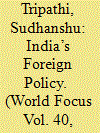

|
|
|
|
|
| Summary/Abstract |
India’s ongoing efforts, under PM Modi, to seek global engagements with maximum possible number of countries with a view to realize its national interests has more or less brought the country on the global centre-stage thereby defining its new role to perform through increasing multilateralism and greater economic cooperation with them. While this aims to transform the erstwhile non-reacting image of the country following lackadaisical approach in its foreign policy, particularly vis-à-vis cross-border terror strikes inside the India territory on several occasions, into a strong and active nation pursuing pragmatic and muscular approach in international relations, it also provides the required thrust to the same towards securing its social and economic and other national interests in right earnest in the true spirit of India’s ancient cultural tradition and rich heritage committed for common interests of humanity.
|
|
|
|
|
|
|
|
|
|
|
|
|
|
|
|
| 11 |
ID:
169801


|
|
|
|
|
| Summary/Abstract |
The fast-changing Geo-political situation all over world, makes it imperative for a country to amend its foreign policy accordingly. With the appointment of Mr Jaishankar as the Foreign Minister of India, was the correct decision by Prime Minister Narendra Modi as he being a former diplomat (recently superannuated in 2018) could assess the situation correctly. His appointment also clearly indicate that Modi 2 government’s Foreign policy would be based on Economic Diplomacy. At a time when India is negotiating its way through a dynamic geopolitical landscape – from the US to China and Pakistan to the Middle East – External Affairs Minister Subrahmanyam Jaishankar has been entrusted with the task of translating the government’s foreign policy objectives into concrete outcomes.
|
|
|
|
|
|
|
|
|
|
|
|
|
|
|
|
| 12 |
ID:
169817
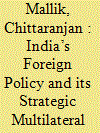

|
|
|
|
|
| Summary/Abstract |
We are living in a well-connected and interdependent multi-polar world where multiple powers are competing and cooperating with each other. It is widely believed today that the centre of gravity in the world politics is shifting away from the west to south emerging powers and India is now a leading global power. Given its status as the world’s largest democracy, India’s rise as a power on the global stage has increasingly drawn global attention. Instead of focusing on great power competition, India kept itself more relevant in the international community by reshaping its foreign policy according to the changing global scenario, and embedded in reform of global governance.
|
|
|
|
|
|
|
|
|
|
|
|
|
|
|
|
| 13 |
ID:
169810


|
|
|
|
|
| Summary/Abstract |
India in recent years has taken extraordinary measures in reaching out to all important countries and regions of the world. It has emerged as ‘Global Agenda Setter’ and successfully contributed towards setting global narratives on terrorism, global narratives on economic offenders and global narratives on climate change under the leadership of PM Modi. Indian government has taken several bold steps on international front as well as regional level. His government has taken Indo-US relations t a new height. Indo-Pacific region has received new attention at world level. At the same time, the government has made sure that it succeeds in reviving its strategic ties with Russia after joining SCO. Recent visit of Chinese President Xi to India has helped in stabilising of bilateral-relationship with India’s largest neighbour in aftermath of scrapping of Art 370 in J&K. India has been able to infuse complete independence in its foreign policy towards west asia.
|
|
|
|
|
|
|
|
|
|
|
|
|
|
|
|
| 14 |
ID:
169821


|
|
|
|
|
| Summary/Abstract |
India has an unpleasant history with the Organization of Islamic Cooperation (OIC), an organization which claims to be the voice of Muslims world over. India’s relations with the Muslim countries have vastly improved, especially those in West Asia as Indian economy is seen as an opportunity by these countries. However, OIC as an organization has always made statements about India’s internal affairs, mainly over Kashmir. This has been a major irritant in India-OIC relations. This article will explain India’s historical engagement with OIC, the major irritants in this relationship and the way forward.
|
|
|
|
|
|
|
|
|
|
|
|
|
|
|
|
| 15 |
ID:
169816


|
|
|
|
|
| Summary/Abstract |
India and Africa emerged as two growth poles of the world. Contrasting developmental aspects enables them to write a new chapter of rejuvenation and rebirth in the 21st century. Africa’s abundant natural resources with technical expertise of India create a win-win situation for both. India and Africa shares common colonial history and method of liberation, following independence government of India is closely working with African countries to secure sustainable development. India emerged as a voice of developing countries on various international forums. African countries from the days of Non-Aligned Movement to G77 in the United Nation stand in favor of India. In 2016, South Africa supported India’s bid to membership in nuclear supply group.
|
|
|
|
|
|
|
|
|
|
|
|
|
|
|
|
| 16 |
ID:
169812


|
|
|
|
|
| Summary/Abstract |
hina and India emerged from colonialism in the late 1940s, and immediately started on the paths of reconstruction and economic development. Economic conditions which had been destabilised by their respective colonial histories. The history of colonialism left behind another problematic issue, i.e. of an unsolved boundary dispute. Despite the initial period of cordiality and friendship between the two countries, the relations soured to such an extent that it cumulated in a border skirmish in 1962. The reasons behind the ‘clash’ move beyond just a border dispute and are multi layered as such.
|
|
|
|
|
|
|
|
|
|
|
|
|
|
|
|
| 17 |
ID:
169807
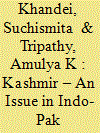

|
|
|
|
|
| Summary/Abstract |
The present history of Kashmir begins with the Treaty of Lahore of8 March 1846, which settled the British conquest of the Sikh Empire.1 The Sikhs had preceded the British in a line of conquerors of the region, and a Dogra chieftain, Ghulab Singh, had been made ruler of Jammu in reward for his services to the Sikh Maharaja Ranjit Singh. By 1839, Ghulab Singh had wrested the territories of Baluchistan and Ladakh from Tibet, thus extending Dogra rule northward and eastward from Jammu.
|
|
|
|
|
|
|
|
|
|
|
|
|
|
|
|
| 18 |
ID:
169811


|
|
|
|
|
| Summary/Abstract |
Kashmir has been the bone of contention ever since the inception of India and Pakistan as two separate independent countries after the end of British colonial rule in 1947. It is perhaps one of the longest continuing political disputes in world history. While India justifiably claims Kashmir as an integral part of its territory after the King of Kashmir Raja Hari Singh, facing aggression from Pak-sponsored militia, signed the Instrument of Accession in October 1947, Pakistan’s obduracy to accept this reality and demand to hold Plebiscite
|
|
|
|
|
|
|
|
|
|
|
|
|
|
|
|
| 19 |
ID:
169813


|
|
|
|
|
| Summary/Abstract |
The recent withdrawal of India from the strategically vital RCEP (Regional Comprehensive Economic Partnership) agreement has been seen by the opposition in India as a bow down of the Narendra Modi government to their opinion. Votaries of the government view this as a timely move to reflect the uncompromising nature of the government on question of ‘national interest’. In the midst of such analysis at domestic setting, this paper argues that Narendra Modi government has build up a model of ‘national foreign policy’ of India which is based on ‘nationalism and monologue’ different from the model of ‘consensual Nehruvian foreign policy’ based on ‘democracy and dialogue’. The paper argues that theoretically a mix of realism and constructivism while practically a mix of domestic electoral strength and external presence capacity have added a uniqueness to Modi’s foreign policy experience.
|
|
|
|
|
|
|
|
|
|
|
|
|
|
|
|
| 20 |
ID:
169815


|
|
|
|
|
| Summary/Abstract |
Pakistan’s persistent objection to the removal of the special status given to the state of Jammu & Kashmir and make Article 370 and Article 35A inoperative, appears to be a legacy of the Two Nation theory of Muhammad Ali Jinnah, the founder of Pakistan. Ever since the division of British India and creation of two independent Nation States, Pakistan has been making counter claims over the entire erstwhile princely state of Jammu & Kashmir. Till date Pakistan has not reconciled to the idea of J&K being part of the Indian Union and under India’s sovereign jurisdiction. Needless to say, Pakistan’s claim over J&K is based on the state’s Muslim majority population.1 Ownership over J&K is viewed by the Pak official establishment as vital to the identity of the Islamic Republic of Pakistan as Homeland for the Muslims in the Indian subcontinent.
|
|
|
|
|
|
|
|
|
|
|
|
|
|
|
|
|
|
|
|
|